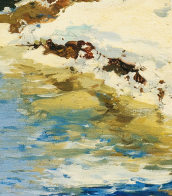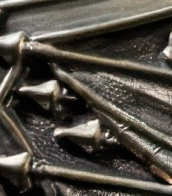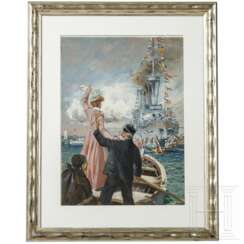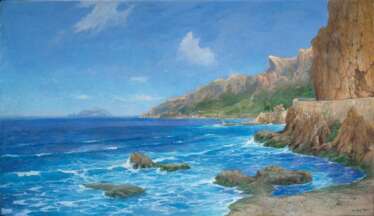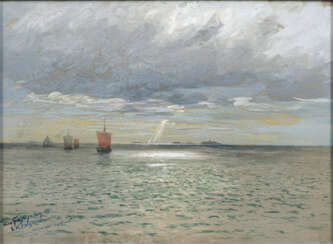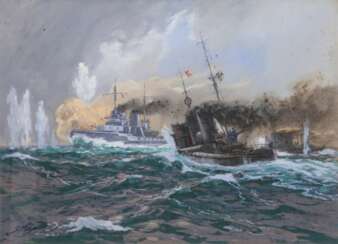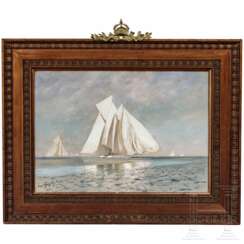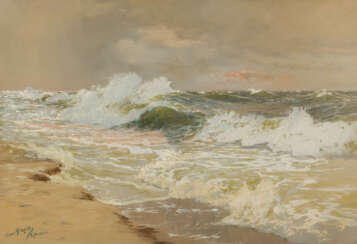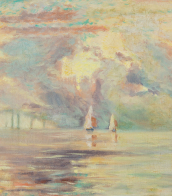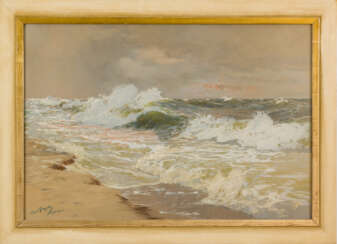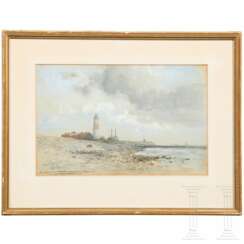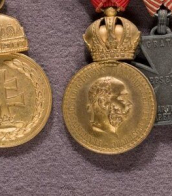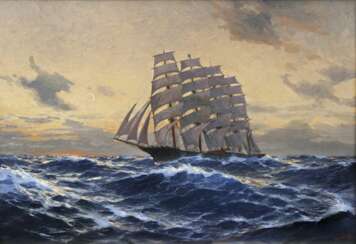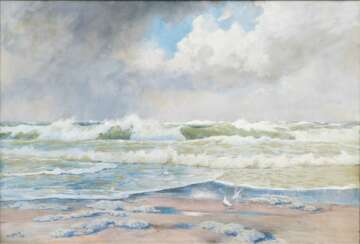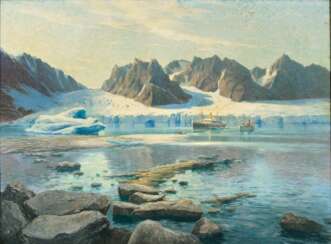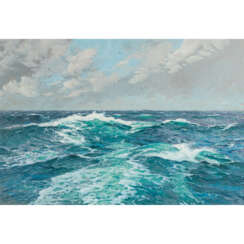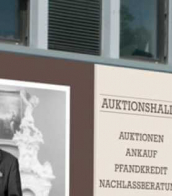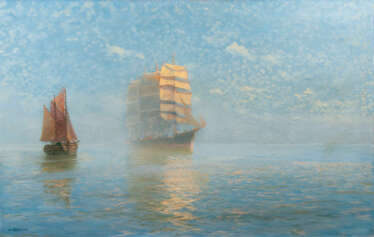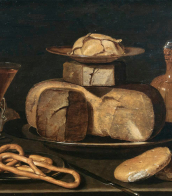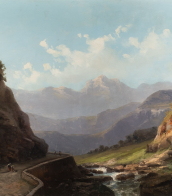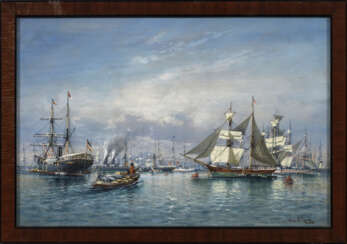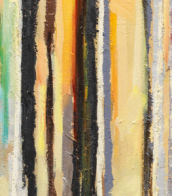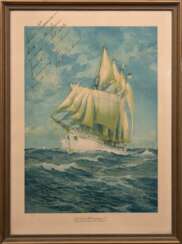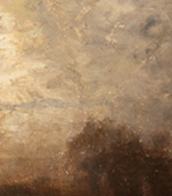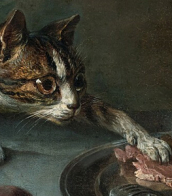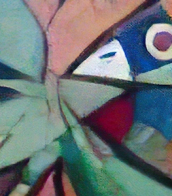hans bohrdt (1857 - 1945)
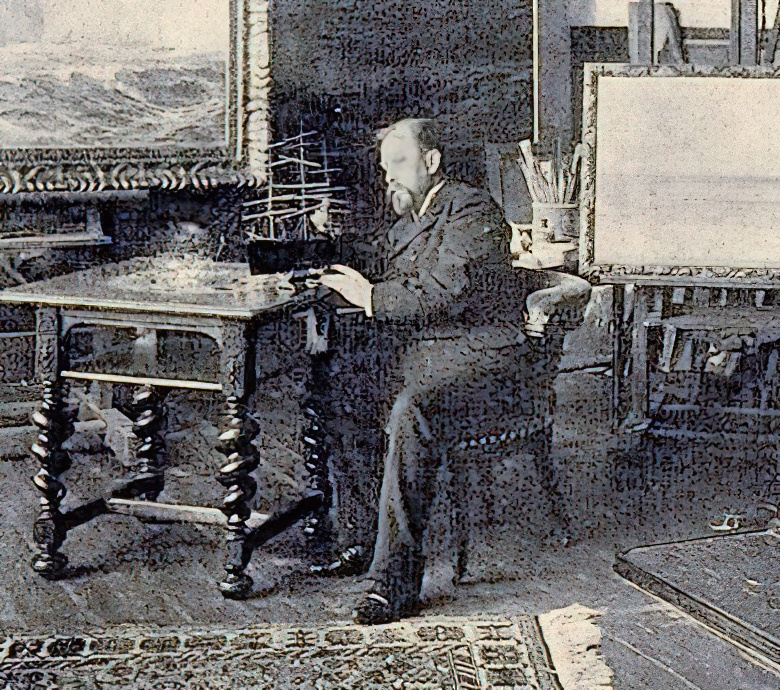
Hans Bohrdt was a German marine painter and graphic artist. Bohrdt's journey into marine painting began after a visit to the Hamburg port at the age of 15, sparking a lifelong passion for the sea and maritime subjects. Unlike many artists of his time who had formal art education, Hans Bohrdt was largely self-taught, although he did attend the Academy of Fine Arts in Berlin for a period. His dissatisfaction with the conventional training led him to pursue a more hands-on approach to his art, focusing on seascapes and marine life.
Hans Bohrdt's work gained significant recognition during the Wilhelmine era, making him a celebrated figure in German marine painting, a genre that became particularly prominent after the unification of Germany in 1871. His close relationship with Kaiser Wilhelm II, who was an admirer and patron of his work, helped elevate Bohrdt's status further. Bohrdt's art was known for its technical skill, particularly in depicting the majesty of the sea and the vessels that traversed it. His pieces often featured German naval prowess and were used for both private collections and public display, contributing to national pride and naval propaganda, especially during World War I.
The legacy of Hans Bohrdt is marked by his ability to capture the spirit and grandeur of maritime life, making him a significant figure in the history of German art. Despite the challenges posed by the world wars, which led to the loss of many of his works including his best-known painting, "Der letzte Mann" ("The Last Man"), Bohrdt's art continues to be celebrated for its contribution to marine painting. In 1995, on the fiftieth anniversary of his death, a memorial exhibition was held, showcasing his contributions to the field and reaffirming his place as one of the last great marine painters.
For collectors and experts in art and antiques, Hans Bohrdt's work offers a unique glimpse into the development of marine painting in Germany, reflecting both the beauty of the maritime world and the historical context of his times. To stay informed about sales, auction events, and updates related to Hans Bohrdt's work, signing up for newsletters from galleries and auction houses specializing in maritime art and antiques is recommended. This ensures enthusiasts and collectors are well-informed about opportunities to acquire pieces by this distinguished artist.
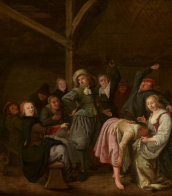

Hans Bohrdt was a German marine painter and graphic artist. Bohrdt's journey into marine painting began after a visit to the Hamburg port at the age of 15, sparking a lifelong passion for the sea and maritime subjects. Unlike many artists of his time who had formal art education, Hans Bohrdt was largely self-taught, although he did attend the Academy of Fine Arts in Berlin for a period. His dissatisfaction with the conventional training led him to pursue a more hands-on approach to his art, focusing on seascapes and marine life.
Hans Bohrdt's work gained significant recognition during the Wilhelmine era, making him a celebrated figure in German marine painting, a genre that became particularly prominent after the unification of Germany in 1871. His close relationship with Kaiser Wilhelm II, who was an admirer and patron of his work, helped elevate Bohrdt's status further. Bohrdt's art was known for its technical skill, particularly in depicting the majesty of the sea and the vessels that traversed it. His pieces often featured German naval prowess and were used for both private collections and public display, contributing to national pride and naval propaganda, especially during World War I.
The legacy of Hans Bohrdt is marked by his ability to capture the spirit and grandeur of maritime life, making him a significant figure in the history of German art. Despite the challenges posed by the world wars, which led to the loss of many of his works including his best-known painting, "Der letzte Mann" ("The Last Man"), Bohrdt's art continues to be celebrated for its contribution to marine painting. In 1995, on the fiftieth anniversary of his death, a memorial exhibition was held, showcasing his contributions to the field and reaffirming his place as one of the last great marine painters.
For collectors and experts in art and antiques, Hans Bohrdt's work offers a unique glimpse into the development of marine painting in Germany, reflecting both the beauty of the maritime world and the historical context of his times. To stay informed about sales, auction events, and updates related to Hans Bohrdt's work, signing up for newsletters from galleries and auction houses specializing in maritime art and antiques is recommended. This ensures enthusiasts and collectors are well-informed about opportunities to acquire pieces by this distinguished artist.
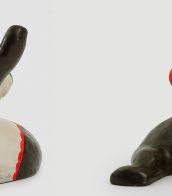

Hans Bohrdt was a German marine painter and graphic artist. Bohrdt's journey into marine painting began after a visit to the Hamburg port at the age of 15, sparking a lifelong passion for the sea and maritime subjects. Unlike many artists of his time who had formal art education, Hans Bohrdt was largely self-taught, although he did attend the Academy of Fine Arts in Berlin for a period. His dissatisfaction with the conventional training led him to pursue a more hands-on approach to his art, focusing on seascapes and marine life.
Hans Bohrdt's work gained significant recognition during the Wilhelmine era, making him a celebrated figure in German marine painting, a genre that became particularly prominent after the unification of Germany in 1871. His close relationship with Kaiser Wilhelm II, who was an admirer and patron of his work, helped elevate Bohrdt's status further. Bohrdt's art was known for its technical skill, particularly in depicting the majesty of the sea and the vessels that traversed it. His pieces often featured German naval prowess and were used for both private collections and public display, contributing to national pride and naval propaganda, especially during World War I.
The legacy of Hans Bohrdt is marked by his ability to capture the spirit and grandeur of maritime life, making him a significant figure in the history of German art. Despite the challenges posed by the world wars, which led to the loss of many of his works including his best-known painting, "Der letzte Mann" ("The Last Man"), Bohrdt's art continues to be celebrated for its contribution to marine painting. In 1995, on the fiftieth anniversary of his death, a memorial exhibition was held, showcasing his contributions to the field and reaffirming his place as one of the last great marine painters.
For collectors and experts in art and antiques, Hans Bohrdt's work offers a unique glimpse into the development of marine painting in Germany, reflecting both the beauty of the maritime world and the historical context of his times. To stay informed about sales, auction events, and updates related to Hans Bohrdt's work, signing up for newsletters from galleries and auction houses specializing in maritime art and antiques is recommended. This ensures enthusiasts and collectors are well-informed about opportunities to acquire pieces by this distinguished artist.
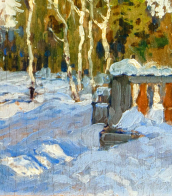

Hans Bohrdt was a German marine painter and graphic artist. Bohrdt's journey into marine painting began after a visit to the Hamburg port at the age of 15, sparking a lifelong passion for the sea and maritime subjects. Unlike many artists of his time who had formal art education, Hans Bohrdt was largely self-taught, although he did attend the Academy of Fine Arts in Berlin for a period. His dissatisfaction with the conventional training led him to pursue a more hands-on approach to his art, focusing on seascapes and marine life.
Hans Bohrdt's work gained significant recognition during the Wilhelmine era, making him a celebrated figure in German marine painting, a genre that became particularly prominent after the unification of Germany in 1871. His close relationship with Kaiser Wilhelm II, who was an admirer and patron of his work, helped elevate Bohrdt's status further. Bohrdt's art was known for its technical skill, particularly in depicting the majesty of the sea and the vessels that traversed it. His pieces often featured German naval prowess and were used for both private collections and public display, contributing to national pride and naval propaganda, especially during World War I.
The legacy of Hans Bohrdt is marked by his ability to capture the spirit and grandeur of maritime life, making him a significant figure in the history of German art. Despite the challenges posed by the world wars, which led to the loss of many of his works including his best-known painting, "Der letzte Mann" ("The Last Man"), Bohrdt's art continues to be celebrated for its contribution to marine painting. In 1995, on the fiftieth anniversary of his death, a memorial exhibition was held, showcasing his contributions to the field and reaffirming his place as one of the last great marine painters.
For collectors and experts in art and antiques, Hans Bohrdt's work offers a unique glimpse into the development of marine painting in Germany, reflecting both the beauty of the maritime world and the historical context of his times. To stay informed about sales, auction events, and updates related to Hans Bohrdt's work, signing up for newsletters from galleries and auction houses specializing in maritime art and antiques is recommended. This ensures enthusiasts and collectors are well-informed about opportunities to acquire pieces by this distinguished artist.


Hans Bohrdt was a German marine painter and graphic artist. Bohrdt's journey into marine painting began after a visit to the Hamburg port at the age of 15, sparking a lifelong passion for the sea and maritime subjects. Unlike many artists of his time who had formal art education, Hans Bohrdt was largely self-taught, although he did attend the Academy of Fine Arts in Berlin for a period. His dissatisfaction with the conventional training led him to pursue a more hands-on approach to his art, focusing on seascapes and marine life.
Hans Bohrdt's work gained significant recognition during the Wilhelmine era, making him a celebrated figure in German marine painting, a genre that became particularly prominent after the unification of Germany in 1871. His close relationship with Kaiser Wilhelm II, who was an admirer and patron of his work, helped elevate Bohrdt's status further. Bohrdt's art was known for its technical skill, particularly in depicting the majesty of the sea and the vessels that traversed it. His pieces often featured German naval prowess and were used for both private collections and public display, contributing to national pride and naval propaganda, especially during World War I.
The legacy of Hans Bohrdt is marked by his ability to capture the spirit and grandeur of maritime life, making him a significant figure in the history of German art. Despite the challenges posed by the world wars, which led to the loss of many of his works including his best-known painting, "Der letzte Mann" ("The Last Man"), Bohrdt's art continues to be celebrated for its contribution to marine painting. In 1995, on the fiftieth anniversary of his death, a memorial exhibition was held, showcasing his contributions to the field and reaffirming his place as one of the last great marine painters.
For collectors and experts in art and antiques, Hans Bohrdt's work offers a unique glimpse into the development of marine painting in Germany, reflecting both the beauty of the maritime world and the historical context of his times. To stay informed about sales, auction events, and updates related to Hans Bohrdt's work, signing up for newsletters from galleries and auction houses specializing in maritime art and antiques is recommended. This ensures enthusiasts and collectors are well-informed about opportunities to acquire pieces by this distinguished artist.


Hans Bohrdt was a German marine painter and graphic artist. Bohrdt's journey into marine painting began after a visit to the Hamburg port at the age of 15, sparking a lifelong passion for the sea and maritime subjects. Unlike many artists of his time who had formal art education, Hans Bohrdt was largely self-taught, although he did attend the Academy of Fine Arts in Berlin for a period. His dissatisfaction with the conventional training led him to pursue a more hands-on approach to his art, focusing on seascapes and marine life.
Hans Bohrdt's work gained significant recognition during the Wilhelmine era, making him a celebrated figure in German marine painting, a genre that became particularly prominent after the unification of Germany in 1871. His close relationship with Kaiser Wilhelm II, who was an admirer and patron of his work, helped elevate Bohrdt's status further. Bohrdt's art was known for its technical skill, particularly in depicting the majesty of the sea and the vessels that traversed it. His pieces often featured German naval prowess and were used for both private collections and public display, contributing to national pride and naval propaganda, especially during World War I.
The legacy of Hans Bohrdt is marked by his ability to capture the spirit and grandeur of maritime life, making him a significant figure in the history of German art. Despite the challenges posed by the world wars, which led to the loss of many of his works including his best-known painting, "Der letzte Mann" ("The Last Man"), Bohrdt's art continues to be celebrated for its contribution to marine painting. In 1995, on the fiftieth anniversary of his death, a memorial exhibition was held, showcasing his contributions to the field and reaffirming his place as one of the last great marine painters.
For collectors and experts in art and antiques, Hans Bohrdt's work offers a unique glimpse into the development of marine painting in Germany, reflecting both the beauty of the maritime world and the historical context of his times. To stay informed about sales, auction events, and updates related to Hans Bohrdt's work, signing up for newsletters from galleries and auction houses specializing in maritime art and antiques is recommended. This ensures enthusiasts and collectors are well-informed about opportunities to acquire pieces by this distinguished artist.
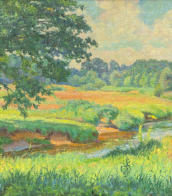

Hans Bohrdt was a German marine painter and graphic artist. Bohrdt's journey into marine painting began after a visit to the Hamburg port at the age of 15, sparking a lifelong passion for the sea and maritime subjects. Unlike many artists of his time who had formal art education, Hans Bohrdt was largely self-taught, although he did attend the Academy of Fine Arts in Berlin for a period. His dissatisfaction with the conventional training led him to pursue a more hands-on approach to his art, focusing on seascapes and marine life.
Hans Bohrdt's work gained significant recognition during the Wilhelmine era, making him a celebrated figure in German marine painting, a genre that became particularly prominent after the unification of Germany in 1871. His close relationship with Kaiser Wilhelm II, who was an admirer and patron of his work, helped elevate Bohrdt's status further. Bohrdt's art was known for its technical skill, particularly in depicting the majesty of the sea and the vessels that traversed it. His pieces often featured German naval prowess and were used for both private collections and public display, contributing to national pride and naval propaganda, especially during World War I.
The legacy of Hans Bohrdt is marked by his ability to capture the spirit and grandeur of maritime life, making him a significant figure in the history of German art. Despite the challenges posed by the world wars, which led to the loss of many of his works including his best-known painting, "Der letzte Mann" ("The Last Man"), Bohrdt's art continues to be celebrated for its contribution to marine painting. In 1995, on the fiftieth anniversary of his death, a memorial exhibition was held, showcasing his contributions to the field and reaffirming his place as one of the last great marine painters.
For collectors and experts in art and antiques, Hans Bohrdt's work offers a unique glimpse into the development of marine painting in Germany, reflecting both the beauty of the maritime world and the historical context of his times. To stay informed about sales, auction events, and updates related to Hans Bohrdt's work, signing up for newsletters from galleries and auction houses specializing in maritime art and antiques is recommended. This ensures enthusiasts and collectors are well-informed about opportunities to acquire pieces by this distinguished artist.
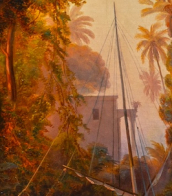

Hans Bohrdt was a German marine painter and graphic artist. Bohrdt's journey into marine painting began after a visit to the Hamburg port at the age of 15, sparking a lifelong passion for the sea and maritime subjects. Unlike many artists of his time who had formal art education, Hans Bohrdt was largely self-taught, although he did attend the Academy of Fine Arts in Berlin for a period. His dissatisfaction with the conventional training led him to pursue a more hands-on approach to his art, focusing on seascapes and marine life.
Hans Bohrdt's work gained significant recognition during the Wilhelmine era, making him a celebrated figure in German marine painting, a genre that became particularly prominent after the unification of Germany in 1871. His close relationship with Kaiser Wilhelm II, who was an admirer and patron of his work, helped elevate Bohrdt's status further. Bohrdt's art was known for its technical skill, particularly in depicting the majesty of the sea and the vessels that traversed it. His pieces often featured German naval prowess and were used for both private collections and public display, contributing to national pride and naval propaganda, especially during World War I.
The legacy of Hans Bohrdt is marked by his ability to capture the spirit and grandeur of maritime life, making him a significant figure in the history of German art. Despite the challenges posed by the world wars, which led to the loss of many of his works including his best-known painting, "Der letzte Mann" ("The Last Man"), Bohrdt's art continues to be celebrated for its contribution to marine painting. In 1995, on the fiftieth anniversary of his death, a memorial exhibition was held, showcasing his contributions to the field and reaffirming his place as one of the last great marine painters.
For collectors and experts in art and antiques, Hans Bohrdt's work offers a unique glimpse into the development of marine painting in Germany, reflecting both the beauty of the maritime world and the historical context of his times. To stay informed about sales, auction events, and updates related to Hans Bohrdt's work, signing up for newsletters from galleries and auction houses specializing in maritime art and antiques is recommended. This ensures enthusiasts and collectors are well-informed about opportunities to acquire pieces by this distinguished artist.


Hans Bohrdt was a German marine painter and graphic artist. Bohrdt's journey into marine painting began after a visit to the Hamburg port at the age of 15, sparking a lifelong passion for the sea and maritime subjects. Unlike many artists of his time who had formal art education, Hans Bohrdt was largely self-taught, although he did attend the Academy of Fine Arts in Berlin for a period. His dissatisfaction with the conventional training led him to pursue a more hands-on approach to his art, focusing on seascapes and marine life.
Hans Bohrdt's work gained significant recognition during the Wilhelmine era, making him a celebrated figure in German marine painting, a genre that became particularly prominent after the unification of Germany in 1871. His close relationship with Kaiser Wilhelm II, who was an admirer and patron of his work, helped elevate Bohrdt's status further. Bohrdt's art was known for its technical skill, particularly in depicting the majesty of the sea and the vessels that traversed it. His pieces often featured German naval prowess and were used for both private collections and public display, contributing to national pride and naval propaganda, especially during World War I.
The legacy of Hans Bohrdt is marked by his ability to capture the spirit and grandeur of maritime life, making him a significant figure in the history of German art. Despite the challenges posed by the world wars, which led to the loss of many of his works including his best-known painting, "Der letzte Mann" ("The Last Man"), Bohrdt's art continues to be celebrated for its contribution to marine painting. In 1995, on the fiftieth anniversary of his death, a memorial exhibition was held, showcasing his contributions to the field and reaffirming his place as one of the last great marine painters.
For collectors and experts in art and antiques, Hans Bohrdt's work offers a unique glimpse into the development of marine painting in Germany, reflecting both the beauty of the maritime world and the historical context of his times. To stay informed about sales, auction events, and updates related to Hans Bohrdt's work, signing up for newsletters from galleries and auction houses specializing in maritime art and antiques is recommended. This ensures enthusiasts and collectors are well-informed about opportunities to acquire pieces by this distinguished artist.


Hans Bohrdt was a German marine painter and graphic artist. Bohrdt's journey into marine painting began after a visit to the Hamburg port at the age of 15, sparking a lifelong passion for the sea and maritime subjects. Unlike many artists of his time who had formal art education, Hans Bohrdt was largely self-taught, although he did attend the Academy of Fine Arts in Berlin for a period. His dissatisfaction with the conventional training led him to pursue a more hands-on approach to his art, focusing on seascapes and marine life.
Hans Bohrdt's work gained significant recognition during the Wilhelmine era, making him a celebrated figure in German marine painting, a genre that became particularly prominent after the unification of Germany in 1871. His close relationship with Kaiser Wilhelm II, who was an admirer and patron of his work, helped elevate Bohrdt's status further. Bohrdt's art was known for its technical skill, particularly in depicting the majesty of the sea and the vessels that traversed it. His pieces often featured German naval prowess and were used for both private collections and public display, contributing to national pride and naval propaganda, especially during World War I.
The legacy of Hans Bohrdt is marked by his ability to capture the spirit and grandeur of maritime life, making him a significant figure in the history of German art. Despite the challenges posed by the world wars, which led to the loss of many of his works including his best-known painting, "Der letzte Mann" ("The Last Man"), Bohrdt's art continues to be celebrated for its contribution to marine painting. In 1995, on the fiftieth anniversary of his death, a memorial exhibition was held, showcasing his contributions to the field and reaffirming his place as one of the last great marine painters.
For collectors and experts in art and antiques, Hans Bohrdt's work offers a unique glimpse into the development of marine painting in Germany, reflecting both the beauty of the maritime world and the historical context of his times. To stay informed about sales, auction events, and updates related to Hans Bohrdt's work, signing up for newsletters from galleries and auction houses specializing in maritime art and antiques is recommended. This ensures enthusiasts and collectors are well-informed about opportunities to acquire pieces by this distinguished artist.


Hans Bohrdt was a German marine painter and graphic artist. Bohrdt's journey into marine painting began after a visit to the Hamburg port at the age of 15, sparking a lifelong passion for the sea and maritime subjects. Unlike many artists of his time who had formal art education, Hans Bohrdt was largely self-taught, although he did attend the Academy of Fine Arts in Berlin for a period. His dissatisfaction with the conventional training led him to pursue a more hands-on approach to his art, focusing on seascapes and marine life.
Hans Bohrdt's work gained significant recognition during the Wilhelmine era, making him a celebrated figure in German marine painting, a genre that became particularly prominent after the unification of Germany in 1871. His close relationship with Kaiser Wilhelm II, who was an admirer and patron of his work, helped elevate Bohrdt's status further. Bohrdt's art was known for its technical skill, particularly in depicting the majesty of the sea and the vessels that traversed it. His pieces often featured German naval prowess and were used for both private collections and public display, contributing to national pride and naval propaganda, especially during World War I.
The legacy of Hans Bohrdt is marked by his ability to capture the spirit and grandeur of maritime life, making him a significant figure in the history of German art. Despite the challenges posed by the world wars, which led to the loss of many of his works including his best-known painting, "Der letzte Mann" ("The Last Man"), Bohrdt's art continues to be celebrated for its contribution to marine painting. In 1995, on the fiftieth anniversary of his death, a memorial exhibition was held, showcasing his contributions to the field and reaffirming his place as one of the last great marine painters.
For collectors and experts in art and antiques, Hans Bohrdt's work offers a unique glimpse into the development of marine painting in Germany, reflecting both the beauty of the maritime world and the historical context of his times. To stay informed about sales, auction events, and updates related to Hans Bohrdt's work, signing up for newsletters from galleries and auction houses specializing in maritime art and antiques is recommended. This ensures enthusiasts and collectors are well-informed about opportunities to acquire pieces by this distinguished artist.
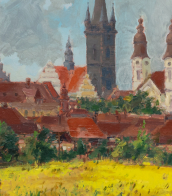

Hans Bohrdt was a German marine painter and graphic artist. Bohrdt's journey into marine painting began after a visit to the Hamburg port at the age of 15, sparking a lifelong passion for the sea and maritime subjects. Unlike many artists of his time who had formal art education, Hans Bohrdt was largely self-taught, although he did attend the Academy of Fine Arts in Berlin for a period. His dissatisfaction with the conventional training led him to pursue a more hands-on approach to his art, focusing on seascapes and marine life.
Hans Bohrdt's work gained significant recognition during the Wilhelmine era, making him a celebrated figure in German marine painting, a genre that became particularly prominent after the unification of Germany in 1871. His close relationship with Kaiser Wilhelm II, who was an admirer and patron of his work, helped elevate Bohrdt's status further. Bohrdt's art was known for its technical skill, particularly in depicting the majesty of the sea and the vessels that traversed it. His pieces often featured German naval prowess and were used for both private collections and public display, contributing to national pride and naval propaganda, especially during World War I.
The legacy of Hans Bohrdt is marked by his ability to capture the spirit and grandeur of maritime life, making him a significant figure in the history of German art. Despite the challenges posed by the world wars, which led to the loss of many of his works including his best-known painting, "Der letzte Mann" ("The Last Man"), Bohrdt's art continues to be celebrated for its contribution to marine painting. In 1995, on the fiftieth anniversary of his death, a memorial exhibition was held, showcasing his contributions to the field and reaffirming his place as one of the last great marine painters.
For collectors and experts in art and antiques, Hans Bohrdt's work offers a unique glimpse into the development of marine painting in Germany, reflecting both the beauty of the maritime world and the historical context of his times. To stay informed about sales, auction events, and updates related to Hans Bohrdt's work, signing up for newsletters from galleries and auction houses specializing in maritime art and antiques is recommended. This ensures enthusiasts and collectors are well-informed about opportunities to acquire pieces by this distinguished artist.
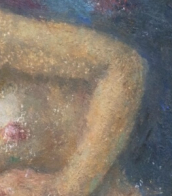

Hans Bohrdt was a German marine painter and graphic artist. Bohrdt's journey into marine painting began after a visit to the Hamburg port at the age of 15, sparking a lifelong passion for the sea and maritime subjects. Unlike many artists of his time who had formal art education, Hans Bohrdt was largely self-taught, although he did attend the Academy of Fine Arts in Berlin for a period. His dissatisfaction with the conventional training led him to pursue a more hands-on approach to his art, focusing on seascapes and marine life.
Hans Bohrdt's work gained significant recognition during the Wilhelmine era, making him a celebrated figure in German marine painting, a genre that became particularly prominent after the unification of Germany in 1871. His close relationship with Kaiser Wilhelm II, who was an admirer and patron of his work, helped elevate Bohrdt's status further. Bohrdt's art was known for its technical skill, particularly in depicting the majesty of the sea and the vessels that traversed it. His pieces often featured German naval prowess and were used for both private collections and public display, contributing to national pride and naval propaganda, especially during World War I.
The legacy of Hans Bohrdt is marked by his ability to capture the spirit and grandeur of maritime life, making him a significant figure in the history of German art. Despite the challenges posed by the world wars, which led to the loss of many of his works including his best-known painting, "Der letzte Mann" ("The Last Man"), Bohrdt's art continues to be celebrated for its contribution to marine painting. In 1995, on the fiftieth anniversary of his death, a memorial exhibition was held, showcasing his contributions to the field and reaffirming his place as one of the last great marine painters.
For collectors and experts in art and antiques, Hans Bohrdt's work offers a unique glimpse into the development of marine painting in Germany, reflecting both the beauty of the maritime world and the historical context of his times. To stay informed about sales, auction events, and updates related to Hans Bohrdt's work, signing up for newsletters from galleries and auction houses specializing in maritime art and antiques is recommended. This ensures enthusiasts and collectors are well-informed about opportunities to acquire pieces by this distinguished artist.


Hans Bohrdt was a German marine painter and graphic artist. Bohrdt's journey into marine painting began after a visit to the Hamburg port at the age of 15, sparking a lifelong passion for the sea and maritime subjects. Unlike many artists of his time who had formal art education, Hans Bohrdt was largely self-taught, although he did attend the Academy of Fine Arts in Berlin for a period. His dissatisfaction with the conventional training led him to pursue a more hands-on approach to his art, focusing on seascapes and marine life.
Hans Bohrdt's work gained significant recognition during the Wilhelmine era, making him a celebrated figure in German marine painting, a genre that became particularly prominent after the unification of Germany in 1871. His close relationship with Kaiser Wilhelm II, who was an admirer and patron of his work, helped elevate Bohrdt's status further. Bohrdt's art was known for its technical skill, particularly in depicting the majesty of the sea and the vessels that traversed it. His pieces often featured German naval prowess and were used for both private collections and public display, contributing to national pride and naval propaganda, especially during World War I.
The legacy of Hans Bohrdt is marked by his ability to capture the spirit and grandeur of maritime life, making him a significant figure in the history of German art. Despite the challenges posed by the world wars, which led to the loss of many of his works including his best-known painting, "Der letzte Mann" ("The Last Man"), Bohrdt's art continues to be celebrated for its contribution to marine painting. In 1995, on the fiftieth anniversary of his death, a memorial exhibition was held, showcasing his contributions to the field and reaffirming his place as one of the last great marine painters.
For collectors and experts in art and antiques, Hans Bohrdt's work offers a unique glimpse into the development of marine painting in Germany, reflecting both the beauty of the maritime world and the historical context of his times. To stay informed about sales, auction events, and updates related to Hans Bohrdt's work, signing up for newsletters from galleries and auction houses specializing in maritime art and antiques is recommended. This ensures enthusiasts and collectors are well-informed about opportunities to acquire pieces by this distinguished artist.
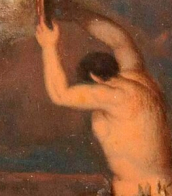

Hans Bohrdt was a German marine painter and graphic artist. Bohrdt's journey into marine painting began after a visit to the Hamburg port at the age of 15, sparking a lifelong passion for the sea and maritime subjects. Unlike many artists of his time who had formal art education, Hans Bohrdt was largely self-taught, although he did attend the Academy of Fine Arts in Berlin for a period. His dissatisfaction with the conventional training led him to pursue a more hands-on approach to his art, focusing on seascapes and marine life.
Hans Bohrdt's work gained significant recognition during the Wilhelmine era, making him a celebrated figure in German marine painting, a genre that became particularly prominent after the unification of Germany in 1871. His close relationship with Kaiser Wilhelm II, who was an admirer and patron of his work, helped elevate Bohrdt's status further. Bohrdt's art was known for its technical skill, particularly in depicting the majesty of the sea and the vessels that traversed it. His pieces often featured German naval prowess and were used for both private collections and public display, contributing to national pride and naval propaganda, especially during World War I.
The legacy of Hans Bohrdt is marked by his ability to capture the spirit and grandeur of maritime life, making him a significant figure in the history of German art. Despite the challenges posed by the world wars, which led to the loss of many of his works including his best-known painting, "Der letzte Mann" ("The Last Man"), Bohrdt's art continues to be celebrated for its contribution to marine painting. In 1995, on the fiftieth anniversary of his death, a memorial exhibition was held, showcasing his contributions to the field and reaffirming his place as one of the last great marine painters.
For collectors and experts in art and antiques, Hans Bohrdt's work offers a unique glimpse into the development of marine painting in Germany, reflecting both the beauty of the maritime world and the historical context of his times. To stay informed about sales, auction events, and updates related to Hans Bohrdt's work, signing up for newsletters from galleries and auction houses specializing in maritime art and antiques is recommended. This ensures enthusiasts and collectors are well-informed about opportunities to acquire pieces by this distinguished artist.
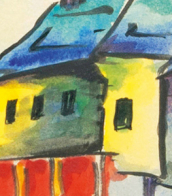

Hans Bohrdt was a German marine painter and graphic artist. Bohrdt's journey into marine painting began after a visit to the Hamburg port at the age of 15, sparking a lifelong passion for the sea and maritime subjects. Unlike many artists of his time who had formal art education, Hans Bohrdt was largely self-taught, although he did attend the Academy of Fine Arts in Berlin for a period. His dissatisfaction with the conventional training led him to pursue a more hands-on approach to his art, focusing on seascapes and marine life.
Hans Bohrdt's work gained significant recognition during the Wilhelmine era, making him a celebrated figure in German marine painting, a genre that became particularly prominent after the unification of Germany in 1871. His close relationship with Kaiser Wilhelm II, who was an admirer and patron of his work, helped elevate Bohrdt's status further. Bohrdt's art was known for its technical skill, particularly in depicting the majesty of the sea and the vessels that traversed it. His pieces often featured German naval prowess and were used for both private collections and public display, contributing to national pride and naval propaganda, especially during World War I.
The legacy of Hans Bohrdt is marked by his ability to capture the spirit and grandeur of maritime life, making him a significant figure in the history of German art. Despite the challenges posed by the world wars, which led to the loss of many of his works including his best-known painting, "Der letzte Mann" ("The Last Man"), Bohrdt's art continues to be celebrated for its contribution to marine painting. In 1995, on the fiftieth anniversary of his death, a memorial exhibition was held, showcasing his contributions to the field and reaffirming his place as one of the last great marine painters.
For collectors and experts in art and antiques, Hans Bohrdt's work offers a unique glimpse into the development of marine painting in Germany, reflecting both the beauty of the maritime world and the historical context of his times. To stay informed about sales, auction events, and updates related to Hans Bohrdt's work, signing up for newsletters from galleries and auction houses specializing in maritime art and antiques is recommended. This ensures enthusiasts and collectors are well-informed about opportunities to acquire pieces by this distinguished artist.


Hans Bohrdt was a German marine painter and graphic artist. Bohrdt's journey into marine painting began after a visit to the Hamburg port at the age of 15, sparking a lifelong passion for the sea and maritime subjects. Unlike many artists of his time who had formal art education, Hans Bohrdt was largely self-taught, although he did attend the Academy of Fine Arts in Berlin for a period. His dissatisfaction with the conventional training led him to pursue a more hands-on approach to his art, focusing on seascapes and marine life.
Hans Bohrdt's work gained significant recognition during the Wilhelmine era, making him a celebrated figure in German marine painting, a genre that became particularly prominent after the unification of Germany in 1871. His close relationship with Kaiser Wilhelm II, who was an admirer and patron of his work, helped elevate Bohrdt's status further. Bohrdt's art was known for its technical skill, particularly in depicting the majesty of the sea and the vessels that traversed it. His pieces often featured German naval prowess and were used for both private collections and public display, contributing to national pride and naval propaganda, especially during World War I.
The legacy of Hans Bohrdt is marked by his ability to capture the spirit and grandeur of maritime life, making him a significant figure in the history of German art. Despite the challenges posed by the world wars, which led to the loss of many of his works including his best-known painting, "Der letzte Mann" ("The Last Man"), Bohrdt's art continues to be celebrated for its contribution to marine painting. In 1995, on the fiftieth anniversary of his death, a memorial exhibition was held, showcasing his contributions to the field and reaffirming his place as one of the last great marine painters.
For collectors and experts in art and antiques, Hans Bohrdt's work offers a unique glimpse into the development of marine painting in Germany, reflecting both the beauty of the maritime world and the historical context of his times. To stay informed about sales, auction events, and updates related to Hans Bohrdt's work, signing up for newsletters from galleries and auction houses specializing in maritime art and antiques is recommended. This ensures enthusiasts and collectors are well-informed about opportunities to acquire pieces by this distinguished artist.
